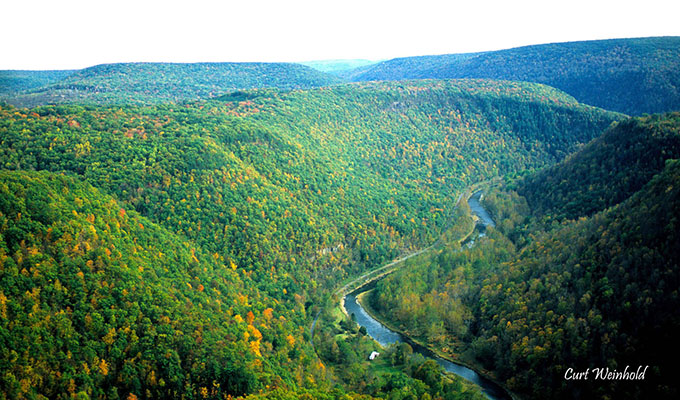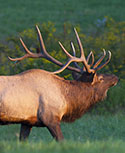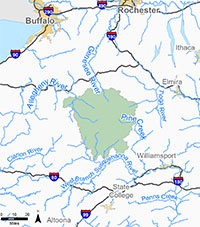As natural gas extraction expands across the Central Appalachian region, that industrial-scale energy development is encroaching on public lands that are critically important for fishing and hunting. In this report, Trout Unlimited takes a deeper look into those public places, outlining the potential risks posed by gas drilling operations and providing recommendations from sportsmen and women that promote responsible energy development.
Pine Creek, Genesee, and Allegheny Headwaters Area

The Place
The headwaters of three famed tributaries — Pine Creek and the Genesee and Allegheny rivers — begin their descent from the same mountaintop, each flowing downstream through unspoiled wilderness in northcentral Pennsylvania. The heart of “God’s Country,” just downstream of where the three headwaters originate, is comprised of state forest and game lands and eight state parks, providing sportsmen and women with an abundance of hunting, angling and trapping opportunities.
The areas of northcentral Pennsylvania that surround the Pine, Genesee and Allegheny headwaters and tributaries contain some of the state’s few remaining wilderness trout watersheds, have the greatest number of Class A Wild Trout and naturally reproducing trout waters, and hold the annual record for highest bear harvest and rates of grouse flush. Winding roads, steep valleys and dense forests create the rim of the Pine Creek Gorge — a prized trout fishing destination that attracts anglers and tourists from across the East Coast.
The Threat
Most of the Pine-Genesee-Allegheny headwaters area falls within Potter County — an area that has yet to see intensive shale gas drilling, in stark contrast to its eastern neighbor, Tioga County. Yet Potter County is experiencing the side effects of surrounding energy development. As shale gas drilling continues to spread across northcentral Pennsylvania, new access roads and pipelines—including temporary water lines, gathering lines and transmission lines—are being built on the steep slopes of the Pine Creek Gorge. There has been significant erosion and sedimentation, which affects high quality trout streams.
Shale gas drilling that is occurring on public lands — primarily, state game lands and state forests — can limit access to the areas where sportsmen and women have traditionally hunted and fished. Industrial drilling operations in the woods are accompanied by nighttime lighting and loud noise from compressor stations and the drilling process. These disturbances can dramatically affect key wildlife breeding seasons and the quality of the sporting experience.
The Need to Protect
 To protect the world-class hunting and angling opportunities available in the Pine-Genesee-Allegheny headwaters area, sportsmen and women are working with state agencies, the Susquehanna River Basin Commission and local governments to (1) ensure stream flow levels are protected before water withdrawals for gas drilling are permitted; (2) make sure strict erosion and sediment control measures are in place and properly functioning before construction of well pads, pipelines and roads begin; (3) ban drilling-related infrastructure development in the floodplain; (4) minimize the footprint of well pad sites in this headwaters area; and (5) protect the hunting, fishing and trapping traditions on state game and forest lands through adoption of best management practices.
To protect the world-class hunting and angling opportunities available in the Pine-Genesee-Allegheny headwaters area, sportsmen and women are working with state agencies, the Susquehanna River Basin Commission and local governments to (1) ensure stream flow levels are protected before water withdrawals for gas drilling are permitted; (2) make sure strict erosion and sediment control measures are in place and properly functioning before construction of well pads, pipelines and roads begin; (3) ban drilling-related infrastructure development in the floodplain; (4) minimize the footprint of well pad sites in this headwaters area; and (5) protect the hunting, fishing and trapping traditions on state game and forest lands through adoption of best management practices.
SPORTSMEN IN THE SPOTLIGHT
Potter County is known as God’s Country, and the reason it’s called God’s Country is it’s a place only God could have made. Dr. Pete Ryan,President of God’s Country Chapter of TU since 1978


